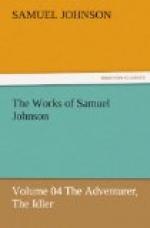“Seldom in war a match
for single persons—nor in peace; therefore
kings make themselves absolute.
Confederacies in learning—every
great work the work of one.
Bruy. Scholars friendship like
ladies. Scribebamus,
&c. Mart. The apple of discord—the
laurel of
discord—the poverty
of criticism. Swift’s opinion of the power
of
six geniuses united.
That union scarce possible. His remarks just;
—man a social, not steady
nature. Drawn to man by words, repelled
by passions. Orb drawn
by attraction, rep. [repelled] by
centrifugal.
“Common danger unites
by crushing other passions—but they return.
Equality hinders compliance.
Superiority produces insolence and
envy. Too much regard
in each to private interest;—too little.
“The mischiefs of private
and exclusive societies.—The fitness of
social attraction diffused
through the whole. The mischiefs of too
partial love of our country.
Contraction of moral duties.
[Greek: Oi philoi,
ou philos].
“Every man moves upon his own centre, and therefore repels others from too near a contact, though he may comply with some general laws. Of confederacy with superiors every one knows the inconvenience. With equals no authority;—every man his own opinion—his own interest.
“Man and wife hardly united;—scarce ever without children. Computation, if two to one against two, how many against five? If confederacies were easy—useless;—many oppresses many.—If possible only to some, dangerous. Principum amicitias.”
No. 50. SATURDAY, APRIL 28, 1753.
Quicunque turpi fraude semel innotuit,
Etiamsi verum dicit, amittit fidem.
PHAED. Lib. i. Fab. x. l.
The wretch that often has deceiv’d,
Though truth he speaks, is ne’er
believ’d.
When Aristotle was once asked, what a man could gain by uttering falsehoods? he replied, “Not to be credited when he shall tell the truth.”
The character of a liar is at once so hateful and contemptible, that even of those who have lost their virtue it might be expected that from the violation of truth they should be restrained by their pride. Almost every other vice that disgraces human nature, may be kept in countenance by applause and association: the corrupter of virgin innocence sees himself envied by the men, and at least not detested by the women; the drunkard may easily unite with beings, devoted like himself to noisy merriments or silent insensibility, who will celebrate his victories over the novices of intemperance, boast themselves the companions of his prowess, and tell with rapture of the multitudes whom unsuccessful emulation has hurried to the grave; even the robber and the cut-throat have their followers, who admire their address and intrepidity, their stratagems of rapine, and their fidelity to the gang.




